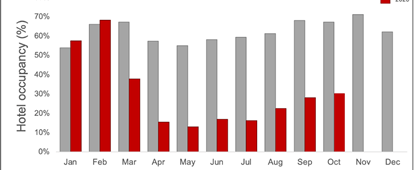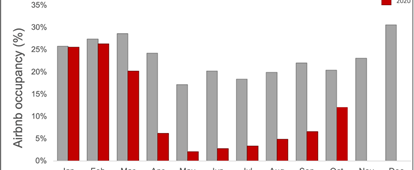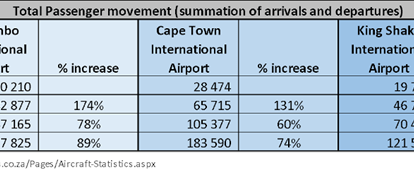By creating an account, I agree to the
Terms of service and Privacy policy
Choose your country and language:
Africa
Americas
Asia Pacific
Europe
WWhile domestic tourism is still far from full recovery, all indications signal a glimmer of hope on the horizon. When South Africa went into lockdown on 26 March 2020, both domestic and international travel came to a standstill. The easing of lockdown levels at the start of June ushered in domestic business travel. In late July, intra-provincial travel opened up which meant that South Africans could travel within their provinces. This was shortly followed by the opening of inter-provincial travel, spurring life into the domestic travel market.
The results from South African Tourism’s Domestic Survey for the month of August show that domestic travel reached 62% of the 3,9 million trips seen in August 2019. This result indicates that desire for domestic travel was high and that travel is expected to increase in the latter months of 2020. The most popular month for travel is December, where most South Africans intend on takin holiday trips.
The predicted upswing in domestic travel is evident in both accommodation and flight patterns. According to TrevPAR World, occupancy of 1015 hotels in South Africa during October was almost half (45%) of occupancy at the same time in 2019. A steady recovery of occupancy from May onwards can be seen with Year on Year comparison in occupancies increasing from 24% of 2019 in May to 45% of 2019 in October.

TThere was some recovery in occupancy for 3 to 5 star hotels, with the occupancy for October 2020 registering at 29.6% (the occupancy rate was 67% in October 2019). This signals a steady recovery from previous months in 2020 where the occupancy was 16,8% in May, 18.1% in June, 17.3% in July, 23.1% in August, 27.4% in September.
Similar trends can be seen for AirBnB occupancy with October occupancy at 59% of occupancies seen in 2019. Importantly, this was double the occupancy rate of September (30%).

AAccording to Airports Company South Africa (ACSA), there has been an increase in domestic passenger movements between the months of June and September 2020. All three international airports in South Africa, OR Tambo International Airport (ORT), Cape Town International Airport (CTIA) and King Shaka International Airport have seen a month-on-month increase in passenger numbers from June to September 2020. This increase indicates that there has been an upswing in domestic travel in recent months. As of 6 September, ORT accounts for the biggest amount for domestic passenger traffic (277,825) followed by CTIA (183,590).

WWith increases in domestic travel evident, it is important to understand the preferences of these travellers. From a South African Tourism study conducted earlier in 2020, 35.7% of the respondents said they were looking forward to a beach experience in their first trip post lockdown, while 34.4% said they wanted to experience nature and scenic outdoors. Another 34.4% wanted to experience open spaces such as mountains, bush and hiking trails.
Additionally, one in three respondents said they would prefer accommodation establishments with clear communication about cleaning and safety protocols, while another 33% would prefer properties with fewer guests. Competitive pricing, health and safety guidelines coupled with up-to-date information were most desired by respondents. In this regard, the sector’s initiatives to embed standardised health and safety measures at all touchpoints in the tourism value chain is commendable. That is why we encourage accommodation establishments to be graded as we strive to maintain our competitive edge as a tourism destination.
In order to meet the needs of the domestic tourism market, as a tourism sector, we need to ensure that products are priced at a desirable rate, that tourism products in South Africa have very clear COVID-19 protocols that are well communicated and consumers have information on products and experiences that are available to them while they are on their domestic trips.
Hygiene is an important driver for travel. All establishments catering for tourists must make a concerted effort to visibly demonstrate their commitment to maintaining the highest standards in hygiene by providing information on their websites and displaying the measures that they taking to keep their guests safe.
Over the lockdown period, there was a sense of feeling exhausted, stressed and restless from being couped up at home for an extended period and wanting to get away to wide open spaces. It is evident that the domestic tourist is now picking up on this desire with an upswing in bookings, accommodation and flights.
With the festive season approaching families are also wanting to spend time together after all the time apart during the year. Travelers are looking for accommodation establishments and experiences that have implemented Covid-19 protocols in order to ensure that they and their family are safe during their travels. This, however, is coupled with fear, due to the rise in COVID-19 infections.
Recently, the Minister of Health proclaimed that South Africa has officially entered the second wave of the pandemic, which will impact people’s decisions on whether or not to travel as well as how they choose to travel.
Should the spike in COVID-19 cases continue, an impact on the tourism sector will be felt, should government re-impose of lockdown conditions. This would have a disastrous effect on the tourism industry, just as the sector was beginning to show signs of recovery.

